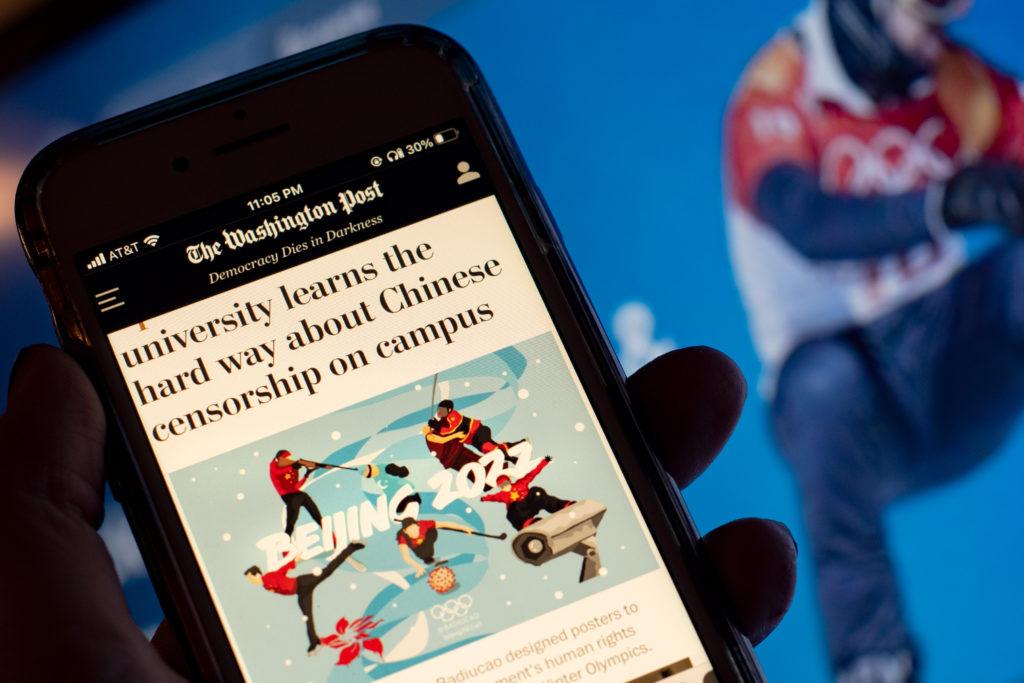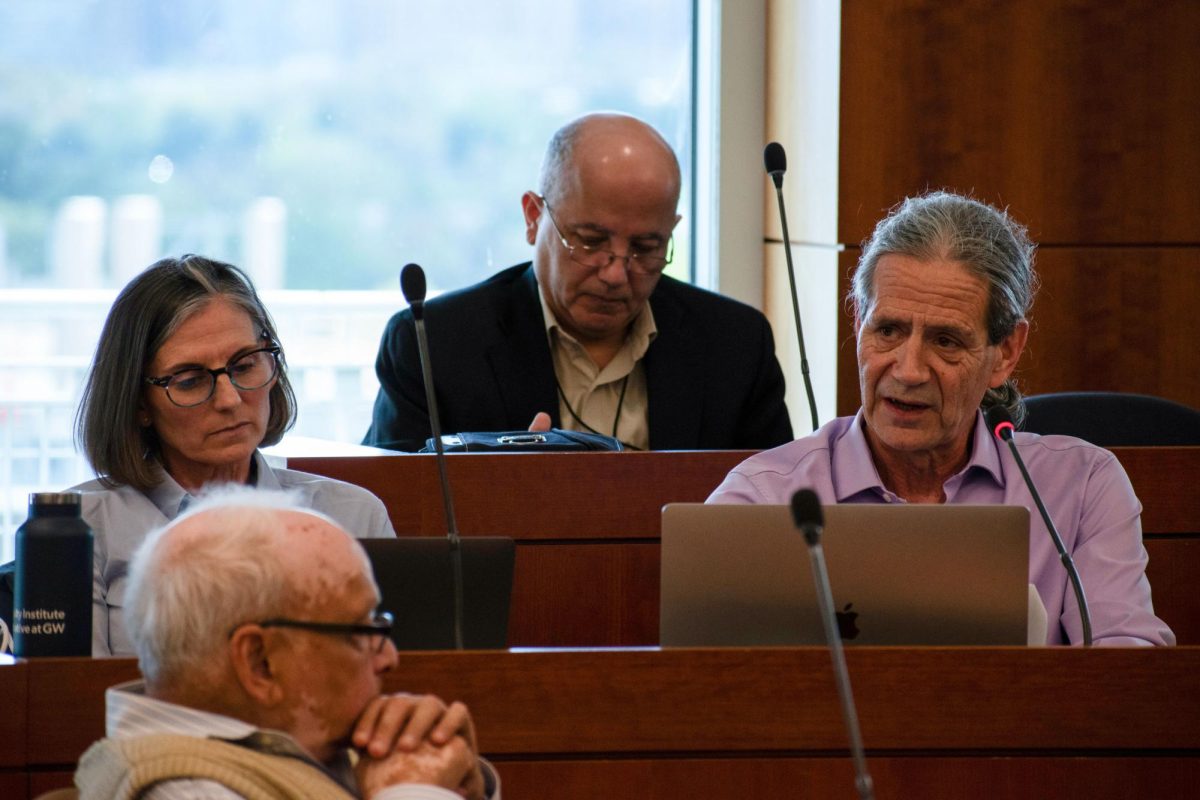Interim University President Mark Wrighton’s decision to remove posters criticizing the Chinese government – which he has since called a mistake – has attracted national attention this week, with the incident eliciting broader concerns over Chinese censorship at U.S. colleges.
The removal of the posters, which denounced the Chinese Communist Party’s human rights abuses against the Uyghur people, has led to a five-minute segment on CNN, extensive coverage in conservative media outlets and a speech on the floor of the U.S. House of Representatives. Many student groups, including GW College Democrats and GW College Republicans, have spoken out about the incident, with some calling on the University to divest from companies “complicit” in the Uyghur genocide.
Posters spark campus-wide debate
Badiucao, a Chinese dissident artist living in Australia, said he learned his artwork was displayed at GW when students messaged him that the Chinese Students and Scholars Association, a group with strong ties to the CCP, was performing a “manhunt” to find the students who displayed the posters they viewed to be racist. He defended the art in a Twitter thread Friday, citing his Chinese nationality and calling attacks on his art a “smear campaign” meant to stifle his free speech.
“They’re calling persecution on those people who put up the posters, and it was just really badly written as well as kind of aggressive,” Badicuao said in an interview with The Hatchet.
Critics of one of the five poster designs, which displayed a Chinese curler pushing a coronavirus molecule, said the image is reminiscent of previous racist attacks that have connected Asian Americans to the COVID-19 pandemic, leading to an increase of hate crimes against Asian Americans during the pandemic.
Wrighton privately responded to a message from someone concerned about the posters, saying officials would take down the posters and determine who was responsible for displaying them. Wrighton publicly reversed course in a statement Monday, saying he had initially responded “hastily” and did not understand the art’s context at the time.
“Upon full understanding, I do not view these posters as racist; they are political statements,” Wrighton said in the statement. “There is no University investigation underway.”
Badiucao, who declined to provide the identities of the students who put up the posters because of “security reasons,” said the students were “deeply worried” by administrators’ initial plans to investigate their actions.
“That makes everyone from that group extremely scared to be honest, and I just feel really sorry for those students who are brave enough to make a statement,” Badiucao said.
He said he wants to see the University display his art on campus again to foster a conversation among the GW community, adding that he would be willing to travel to GW to hold a discussion with students who disagree about his art.
“I do hope this event will greenlight more of this discussion [to happen] in GW in the future,” he said. “But obviously not in a way to discriminate [against] any Chinese student, but including them, allowing them to see different things and perhaps gradually establish their independent view independent from China’s propaganda.”
In a public statement issued Tuesday, the CSSA said although members support freedom of speech and expression, the “inflammatory” coronavirus-related poster racially discriminates against Asian students, making them feel unsafe on campus.
“The presence of this poster is making a large number of Asian students feel uncomfortable and unsafe,” the statement reads. “We condemn this hurtful poster image that could contribute to the promotion of hate against Chinese and other Asian students.”
Posters’ removal becomes national controversy
Since Badiucao posted about the artwork Friday, the incident has caught the eyes of free speech groups, national media outlets and some Republican politicians who are debating Wrighton’s initial decision to remove the posters that some students viewed as racist instead of promoting freedom of speech and expression.
The posters have drawn headlines from The Washington Post, Fox News, Axios and the Chronicle of Higher Education this week. Members of China Central Television – a broadcasting company owned by the CCP – were seen walking near Madison and Duques halls Tuesday, according to a tweet from the Athenai Institute, a student-run nonprofit urging universities to divest from the CCP.
Several Republican members of Congress, including Sens. Marco Rubio, R-Fla., and Ted Cruz, R-Texas, tweeted about the incident involving the posters earlier this week. Rep. Virginia Foxx, R-N.C. and the ranking member of the House Committee on Education and Labor, said on the House floor Wednesday afternoon that people should celebrate the “courage” of the students who hung the posters.
“Calling these posters racist is absurd and a dishonest attempt to pander to an authoritarian regime housing ethnic minorities in modern-day concentration camps,” Foxx said on the House floor. “They aren’t promoting racism but decrying it.”
Students grapple with racism, CCP divestment
Students have debated how the University should protect students from racism while upholding free speech on campus amid the debate surrounding the posters.
College Republicans released a statement Monday saying members were “reassured” by Wrighton’s “commitment to free speech” after he reversed his opposition to the posters.
“The Executive Board of GW College Republicans fully support the expressions of free speech on campus criticizing the Chinese Communist Party and their role in the Uyghur Genocide,” the statement reads.
College Republicans partnered with College Democrats, the GWU Committee on Divestment from the Uyghur Genocide and the Athenai Institute to launch a petition calling on officials to divest from companies “complicit” in the genocide, which has collected more than 200 signatures as of Wednesday evening.
“We encourage our University to uphold this statement with actions such as divesting from companies that enable immoral endeavors of the CCP,” the Republicans’ statement reads. “We are proud to work with GW College Democrats and the Athenai Institute on advocating for this divestment from the Uyghur Genocide. We look forward to further collaboration with the administration.”
Student Association Sen. Gabriel Young, CCAS-U, authored a resolution – which failed to pass the SA’s student life committee – calling for the removal of the posters that depicted a Chinese curling athlete pushing a coronavirus. The resolution would have urged officials to hold diversity training for the students who hung the posters, but it failed due to “fear of safety for the students” who displayed the posters if their identities were revealed.
He said the poster should be removed given the history of racist incidents and hate crimes connecting Asian Americans to the pandemic. Young said he did not support taking down any of the other posters, which he considered valid geopolitical discourse.
“These students were being made fun of for wearing masks, and people would try to imply that they started COVID themselves,” Young said. “Having that lived experience and seeing it for myself, I knew that this poster still had the potential to do the same thing that happened two years ago.”
Young said the SA should also host a listening session to hear from community members who can suggest how to prevent anti-Asian hate on campus and wants the students who displayed the posters to participate in a dialogue about why some people believe the coronavirus poster is wrong.
“The intentions of the artist was to talk about how the Chinese government-censored scientists who knew about the virus,” Young said. “At first glance, no one would understand that, and it has the possibility and potential for physical harm if someone wants to take it out on someone.”











